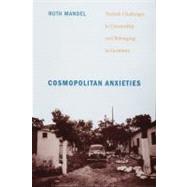Cosmopolitan Anxieties
, by Mandel, Ruth- ISBN: 9780822341932 | 082234193X
- Cover: Paperback
- Copyright: 6/30/2008
InCosmopolitan AnxietiesRuth Mandel explores Germany's relation to the more than two million Turkish immigrants and their descendants living within its borders. Based on her two decades of ethnographic research in Berlin, she argues that Germany's reactions to the post-war Turkish diaspora have been charged, inconsistent, and resonant of past problematic encounters with a Jewish "other." Mandel examines the tensions in Germany between race-based ideologies of blood and belonging on the one hand and ambitions of multicultural tolerance and cosmopolitanism on the other. She does so by juxtaposing the experiences of Turkish immigrants, Jews, and "ethnic Germans" in relation to issues including Islam, Germany's Nazi past, and its radically altered situation as a unified country in the post-Cold War era.Mandel explains that within Germany the popular understanding of what it means to be German is often conflated with citizenship, so that a German citizen of Turkish background can never be a "real German." This conflation of blood and citizenship was dramatically illustrated when, during the 1990s, nearly two million "ethnic Germans" from Eastern Europe and the former Soviet Union arrived in Germany with a legal and social status far superior to that of "Turks" who had lived in the country for decades. Mandel analyzes how representations of Turkish difference are appropriated or rejected by Turks living in Germany; how second- and third-generation Turkish immigrants are exploring new configurations of identity and citizenship through literature, film, hip-hop, and fashion; and how migrants returning to Turkey find themselves changed by their experiences in Germany. She maintains that until difference is truly legitimized, there will continue to be serious tension regarding resident foreigners, despite many sincere attempts to realize a multicultural, cosmopolitan vision of Germany.






